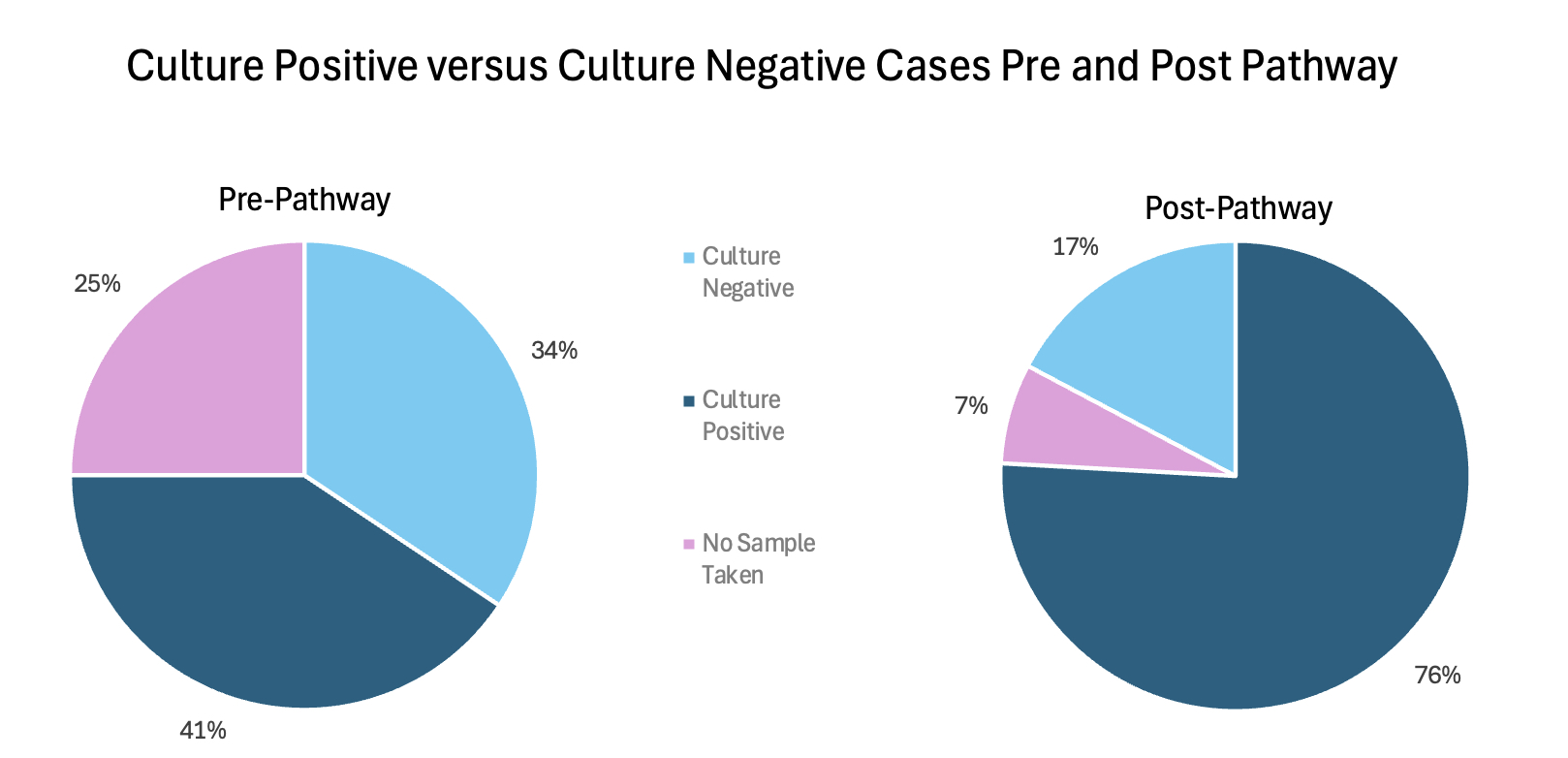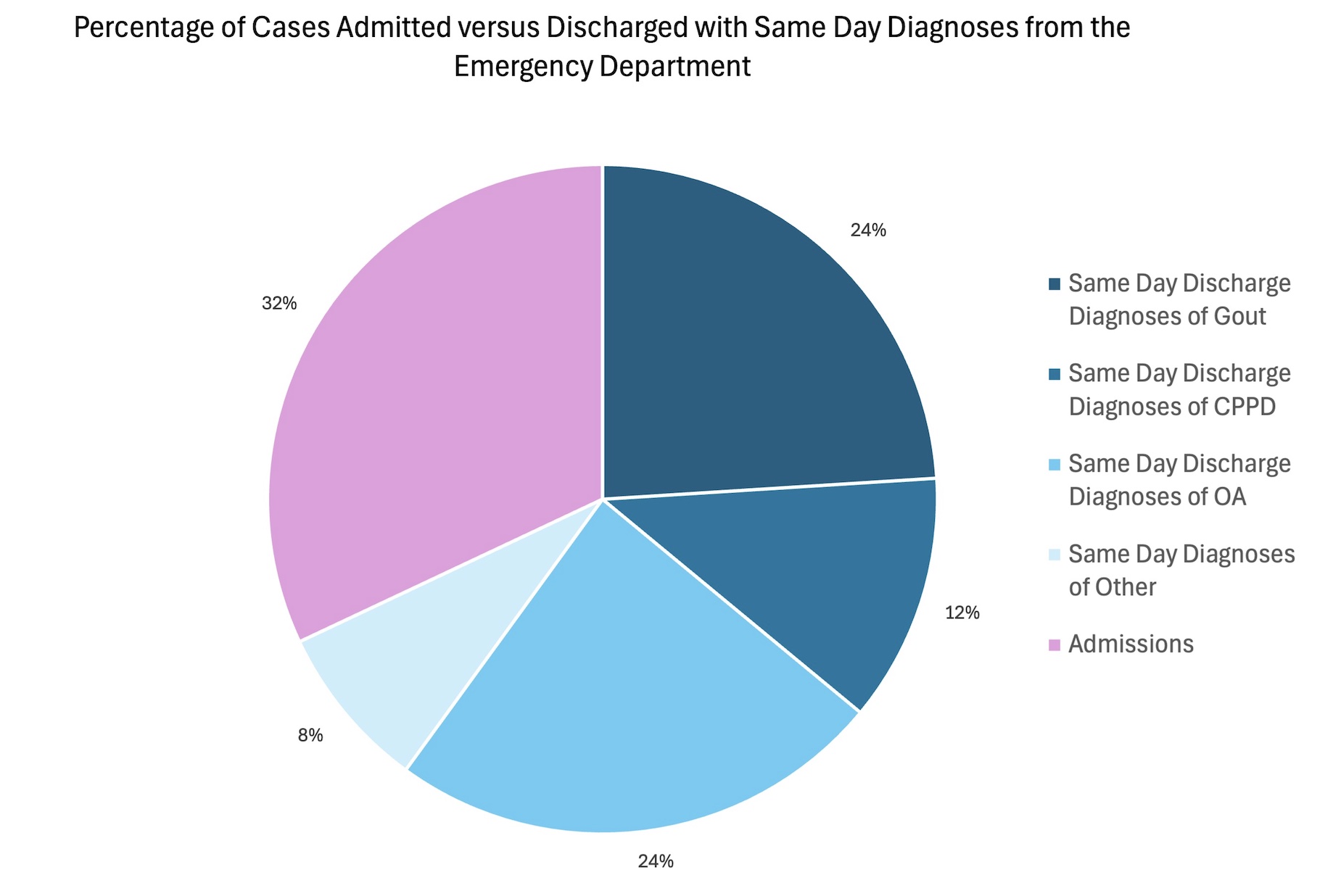Session Information
Session Type: Poster Session B
Session Time: 10:30AM-12:30PM
Background/Purpose: Patients with acute swollen joints are often presumed to have septic arthritis, leading to treatment with intravenous antibiotics and arthroscopic washout. Previously at our centre, joint fluid aspirates often lacked crystal analysis resulting in excess culture negative septic arthritis diagnoses. To address this, stakeholders from the emergency department (ED), infectious disease, orthopaedic, and rheumatology services developed a ‘Hot Joint Pathway’. We hypothesised that since acute crystal arthropathy can be misdiagnosed as ‘culture-negative septic arthritis’, introducing the pathway would increase diagnostic accuracy and decrease unnecessary admissions, intravenous antibiotics and joint washouts.
Methods: A “Hot Joint Pathway” was developed to provide a structured approach for investigating acutely swollen joints, outlining necessary blood tests, sepsis assessment, indications for joint aspiration and guidance on distinguishing septic arthritis from other conditions such as crystal arthritis. Key features of the pathway include a secure messaging app for multidisciplinary discussion and rheumatology-led rapid access polarized light microscopy (PLM) within 24 hours. A service evaluation, approved by our clinical audit committee, was completed following the pathway’s introduction. Hospital inpatient data from the Mater Misericordiae University Hospital, Dublin, identified patients labelled with septic arthritis (including culture negative cases) discharged between two periods: before the pathway (01/01/2019 to 30/11/2020) and after its introduction (22/09/2022 to 21/02/2024). Data were also recorded for patients presenting with an acute swollen joint at the ED who were subsequently discussed on the secure messaging app between 27/09/2022 and 25/09/2023. Patient medical records, laboratory results, and radiology reports were reviewed.
Results: Of the patients discussed on the secure messaging app who presented to the ED, 92% received rheumatology input, and 100% underwent joint aspiration with crystal analysis by a rheumatologist in less than 24 hours. 68% of patients avoided hospital admission, receiving same-day discharge. Of these 53% received a same day diagnoses of crystal arthropathy and were discharged with a plan for rheumatology outpatient follow-up. Diagnostic accuracy increased substantially following introduction of the pathway (Table 1). Joint aspirates increased from 50% to 76%. Culture negative cases of septic arthritis reduced from 34% to 17%. Culture positive cases of septic arthritis increased from 41% to 76%. Crystal analysis increased from 19% to 28%. Positive blood cultures increased from 28% to 41%. Average length of stay reduced by 6 days.
Conclusion: A structured care pathway combining rheumatology-led rapid access PLM and multidisciplinary case discussion via a secure messaging app increases diagnostic accuracy for patients presenting with acute swollen joints. This pathway facilitates admission avoidance, reduces length of stay, and prevents unnecessary surgical intervention, whilst positively impacting antimicrobial stewardship. Access to rheumatology-led point-of-care PLM is essential to the success of this pathway.
To cite this abstract in AMA style:
Lewis A, Stack J, Corish O, Swift C, Breslin T, Lyons F, Muldoon E, McDermott C, Cowley S, Alemayehu H, Boughton O, Taha K, McCarthy G. Rapid Access Microscopy and Real Time Case Discussion via a Secure Messaging App Improves Diagnostic Accuracy and Management of Acute Hot Swollen Joints [abstract]. Arthritis Rheumatol. 2024; 76 (suppl 9). https://acrabstracts.org/abstract/rapid-access-microscopy-and-real-time-case-discussion-via-a-secure-messaging-app-improves-diagnostic-accuracy-and-management-of-acute-hot-swollen-joints/. Accessed .« Back to ACR Convergence 2024
ACR Meeting Abstracts - https://acrabstracts.org/abstract/rapid-access-microscopy-and-real-time-case-discussion-via-a-secure-messaging-app-improves-diagnostic-accuracy-and-management-of-acute-hot-swollen-joints/



